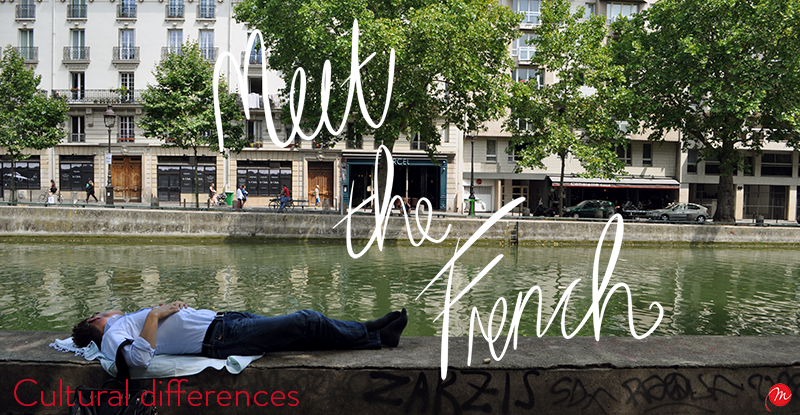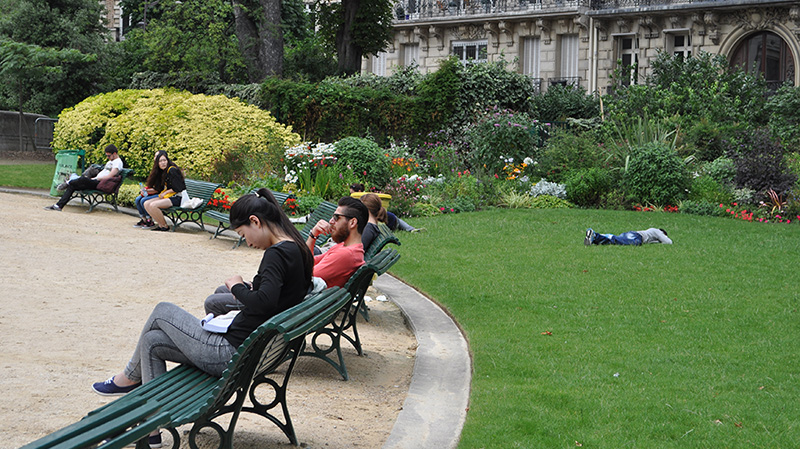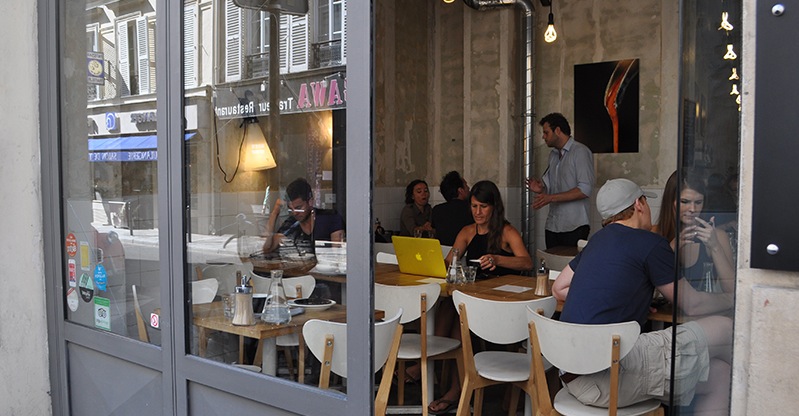Meet the French: cultural differences to be aware of when getting to know locals
At MyFrenchLife™, we are constantly trading tips and looking for newer and better ways to experience France and meet the French beyond the cliché. Bien sûr, it means looking a little further than the latest guide books on offer in Waterstones…
As we discovered in our introduction to the MyFrenchLife™ ‘Meet the French’ project, it’s one thing to attempt to experience la vie française as a tourist, and quite another when you want to truly immerse yourself. In Paris especially, that’s a rather tall order.
It seems that an overwhelming number of us have found that despite valiant efforts, we often fall short when it comes to making meaningful connections with the French.
One thing our community agrees on (despite what you read on the Internet), is that the difficulty is not because the French want to immediately shun any chance of friendship. It’s because they have slightly different expectations of how a friendship comes about. This is the first thing you’ll need to understand if you’re to have success really connecting with the French.
So, together with the MyFrenchLife™ team, I’ve compiled a list of the the key cultural differences we’ve all encountered and experienced. We don’t want you to come away feeling disappointed, or even légèrement embarrassed by your French faux-pas (as perhaps has happened to one or two of us!).
1. The French… take things a little slower
Although this may not be exactly true when it comes to romantic relationships, we’ve found that real connections and friendships are a different story – they mature at a much slower rate en France.
So tout d’abord, slow and steady wins the race – although perhaps this is not exactly the correct metaphor, because the thing to remember is that it’s not a race, so take your time!
One of our very own French correspondents, Jacqueline, nearly made me lose hope entirely when she dryly remarked that “if you make friends with a French person through your gym, don’t expect to be invited to their house after a week… or even a month.” The process will be much slower – but the good news is that when you’re (finally) invited, you can be proud!
2. The French… name-drop much later
Anglophones usually introduce themselves on a first-name basis (although my grandmother is a slight exception, revelling in her full title), but this isn’t the case in France – first names are not expected.
Generally speaking, the French language has always struck me as much more formal than English – being referred to as Madame in a shop still catches me entirely off-guard. But Jacqueline was definite about the importance of this formality: not being given a first name is not a slight, it’s just another cultural difference.
Endearingly, Jacqueline expressed the unease she experienced when the roles were reversed when she lived in the U.S: being obliged to give her first name felt like a huge intrusion. As she described with a slight shudder: “I felt mugged – no, really!”
3. The French… draw a line between ‘tu’ and ‘vous’
Continuing on this note of formality, we know it’s obvious (not that this means most of us haven’t done it), but depending on the circumstances, you really must stick to ‘vous’ rather than ‘tu’ until it has been established that you can switch.
Start a conversation on a formal level – that is, don’t just dive in with “hi, my name is X, what do you do?”
One of my French professors recounted to us how she had used ‘tu’ when meeting her in-laws. She still squirms in embarrassment thinking about how overly familiar they must have found her. And that was about 30 years ago.
4. The French expect… l’apéritif
This is especially true if you’re living somewhere rural, and is an important one to remember: offer un apéritif when a French person calls in. To not do so is rude, and can be perceived as an insult.
5. The French are… more private
This equates to basically not asking too many questions (a polite way of saying nosey). This is one of my own personal errors! Selon un certain francais, I ask far too many questions. So, slowly but surely, I am – hopefully – learning to limit them.
It may not seem that you are asking something overly personal, but be sure to define what this means to a French person. Asking how much a car or a piece of clothing costs is deemed rude, not inquisitive.
6. The French are… fond of giving less information rather than more
Les français seem to find lots of questions and enthusiastic greetings trop américains, and very off-putting – even false. It bewilders them when an Anglophone feigns interest in every aspect of their life, such as their job, family, their day…
On one of my first nights in Paris, a Frenchman who (coolly) struck up a conversation with a friend and me listened with obvious disdain as we listed off what we had done that day. His words were a little harsh, but we got the message: “don’t do that. So much enthusiasm – it’s so not French.”
7. The French are… not over-sharers
Our next tip is to avoid over-sharing at all costs. People worldwide find it uncomfortable, but with all the formality, the French are even more aware of social barriers. De temps en temps, it still feels like I’m pulling teeth with my boyfriend over dinner. He doesn’t see the need to “discuss every detail of his day” – and I want to hear all about it.
8. The French are… aware of current affairs
In my experience, the French are much fonder of discussing current affairs than other people (but I come from Northern Ireland, so it’s a little taboo…). Cultural and social issues are important in France, as are your opinions on these and it comes up often in French conversation – so keep up to date!
It doesn’t take much out of your day, so check out Le Figaro, Le Monde, or even BBC France and form your own opinions. And be prepared to defend them!
9. The French… do not consume in excess
Not that we’re in any way suggesting that you are – but personally, I’ve sometimes been a little nervous at a party and sipped too enthusiastically on a glass of wine. It’s a mistake, because it means I have less control over my French, which doesn’t help the situation in any way…
So at a party, don’t drink too much. It’s frowned upon, and will single you out as being not French. I was once told that it was very ‘provincial’ to drink heavily – oh, the shame!
10. The French… don’t take kindly to criticism
This one isn’t really a cultural difference so to speak, because hardly anyone likes to hear their country and people insulted – but it’s important nonetheless. Don’t think you can bond with people by insulting things you have personally found annoying throughout your day, like the local customs, or shops being closed at certain hours. It can be seen as a slight against French ways.
So, en bref, don’t be rude, and avoid criticisms: saying “back home, we do it this way” is simply annoying.
It’s time to meet the French
French ways may often differ to those of their Anglophone counterparts, but they shouldn’t be automatically dismissed as cold, or unfriendly in any way. It’s quite simply a matter of different rules of courtesy, and respecting them will definitely pay off.
Those who travel to France with the staunch and devoted aim of a properly French experience – c’est-à-dire, away from the irritatingly long queues for la tour Eiffel and the over-priced, distinctly disappointing meals of les Champs-Elysées – should have the tenacity to persevere. France has so much to offer, as we all know, but if you manage to make a connection with a local, your experience (not to mention your language level) will be infinitely better!
So, allez-y, bon courage and stay tuned for more of my experiences getting to know locals in Paris…
How have your experiences been in getting to know locals in France? Share your stories with us below.
Image credits:
1-3 & 5 © Hannah Duke.
4. People reading the newspaper, by Ron Porter, via Pixabay.












Regarding “tu” and “vous”, in informal situations, most young French people (i.e. in their 20s) that I have had contact with in Australia jump straight to using “tu”. French people in their 40s or older only use “vous” with me. In every case I follow their lead. Do you know what the reason for this is? Is it that as an English speaking Australian I am foreign, so they don’t feel the rules apply to me, or young French people don’t feel as constrained by the rules of formality as their elders, or is it something else?
Bonjour Daniel, I am French so I am going to answer you with my knowledge as a native. I don’t believe this matter of fact has anything to do with your being an Australian. If you are same age category as the young, you will be addressed to with TU. People over 40, let’s say, will use VOUS as soon as someone looks like an adult (young or old). As a mature woman, I get VOUS all the time. I only get a TU from someone who is not familiar when at the gym, we are a group of all age categories, we’re all on equal footing, it is a cool atmosphere and the coach says TU to everyone. As soon as we’re outside the class, I get a VOUS. It is really subtle and understand it can be very confusing for learners. But your attitude and understanding are right !
Oh, that makes sense! When I used “vous” with someone who was a few years older than me (about five years older or so), I was surprised that he said I could use “tu” instead – I guess he considered us to be in the same age category?
I also remember another time where I was surprised to hear a teacher in a lycée in Paris address her year 11 students with “vous” – is this again down to formality? I would have thought the teacher would use “tu”, considering that her students were children…
Haha this whole thing is very complicated- the younger generation is also a bit more lax than the older generations, I know of several shops that cater to the younger crowd and the servers will use ‘tu’ which was apparently unheard of before. Always safer to use vous until they tell you you can ‘tutoyer’ them, but insider tip: no matter how many times your mother-in-law protests, always use vous 😉
Hi. I’m French and this topic is one of the difficult thing I had to explain to my in-law Canadian family.
The easiest thing to begin with is to use “vous” everytime you’re talking to an adult and “tu” when talking to a child. If you come familiar with the adult, he may propose you to use “tu”. This means he accepted you to enter his “familiar circle”.
Using “tu” at first meeting may be considered as very unpolite. For instance, saying “tu” to the waiter at the restaurant would be felt as ill-respect, unless the waiter is from your family.
Young people go very quickly to the “tu” (some don’t even go through the “vous” period) but this can be perceived as familiar and not very respectful.
Some teachers (more and more) use VOUS to address teenagers in their classroom even 11-year-old ones because they believe that if they show this kind of respect/ formal language, they will get it back; also it puts some distance between them so as to focus on the learning and not on familiarity which gives way to indiscipline .
Thanks Jacqueline! I am nearly 40 but people often think I am up to 10 years younger. I meet most French people online initially, then in person. It’s up to them to look at my profile to see how old I am! So if a person seems much older, a young person will use “vous”? If so, I’m flattered to still be considered part of the young crowd! The main person who uses “vous” with me is a 45 year old man. So maybe he also considers me part of the young crowd?
In Brittany, I was mistaken a few times for a Pom. Perhaps just for speaking English. My response was to decry the English and Americans, saying that we Australians and French like neither of them, which is we are so alike and understand one another so well. Much joy and many smiles later, I am part of the community. But of course, the Bretons are such wonderful people. Seafarers, and that’s the difference. Brittany’s huge tides and wild seas remind us of our human frailness, and strengthen the warmth of our social bonds.
What an informative article! I found number 3 really interesting because I have only been to France as an exchange student during high school where my classmates immediately used ‘tu’ with me, as did my host family. Now that i’m a little older, i’ll keep the ‘vous’ rules in mind 🙂